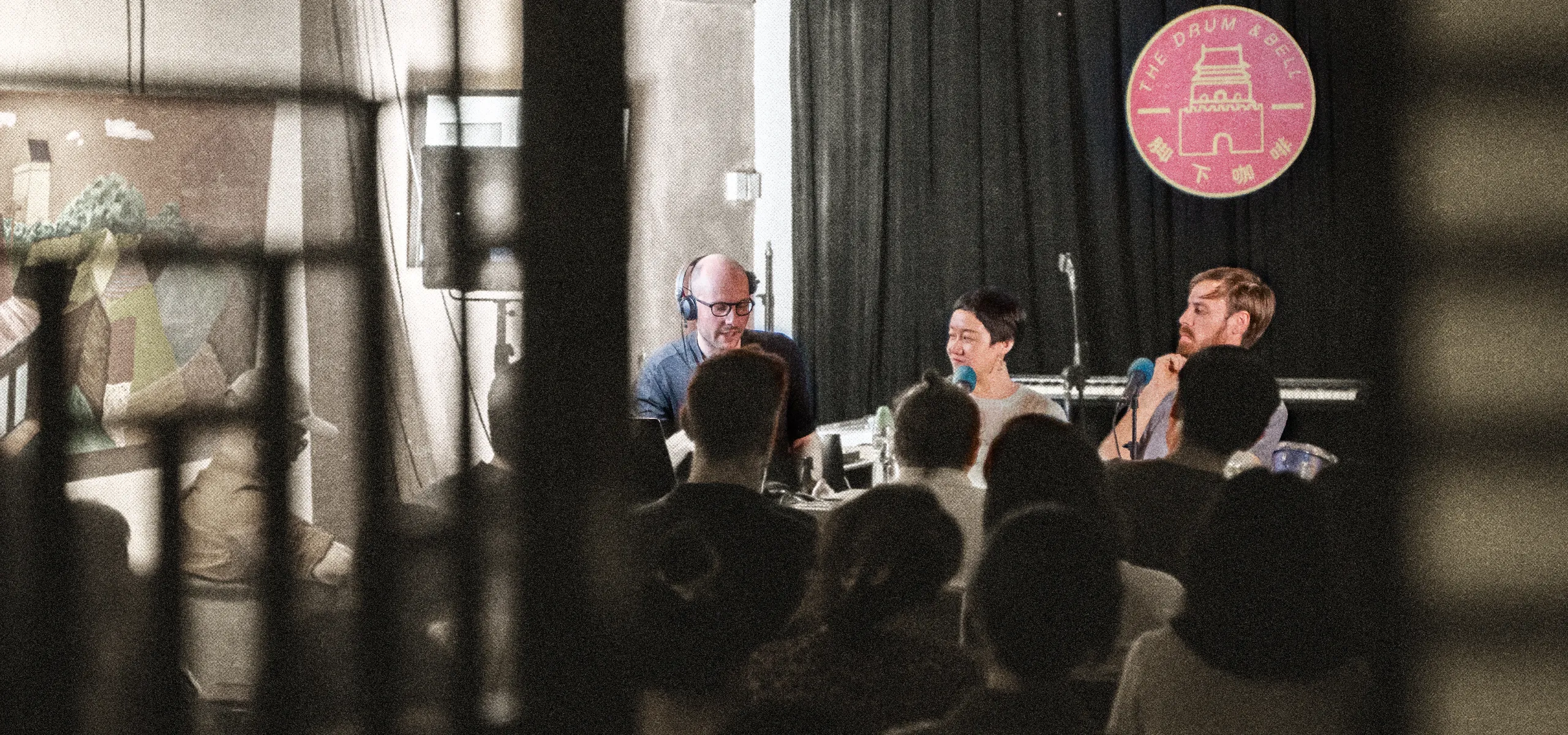Celebrate the 100th episode of the Middle Earth Podcast; reflect on its journey so far with founder Aladin Farré, collaborators, and former guests
Since its establishment in 2018, Middle Earth Podcast has invited 224 insiders from China’s culture industries to discuss the latest trends and produced 4,439 minutes of audio content, covering issues from “patriotic influencers” on Chinese social media to the country’s changing literary scene to women in the industry.
Produced by The World of Chinese and directed, hosted, and edited by Aladin Farré, Middle Earth Podcast showcases what the world’s second biggest culture market is consuming in terms of pop culture—and why. In 2022, Middle Earth Podcast received the silver award in “Best Podcast/Digital Audio Project” in the small/medium company category at WAN-IFRA’s Digital Media Awards Asia.
To celebrate its 100th episode, Aladin invited former guests, collaborators, and a supporting audience to a live recording event in a Beijing hutong bar to discuss his journey so far. This episode features insights into self-media, how the Chinese media landscape has evolved in the past decade, and much more.
Guests:
Aladin Farré is a content producer and the founder of the Middle Earth Podcast.
Sara Huang is a scriptwriter and translator.
Sam Davies is the managing editor of The World of Chinese Magazine.
Subscribe to the Middle Earth Podcast: Apple Podcasts | Spotify | Google Podcasts | Amazon Music | Overcast | RSS Feed
The following are excerpts from the transcript of the episode (edited for clarity):
03:08
Sara: How did the idea of a podcast come to you in the first place?
Aladin: I came to China almost nine years ago. I started to learn Chinese and I always wanted to work in the film and TV industry. I spent six months trying to look for a job. I finally got it when it was only a week from my own personal deadline. And I don’t want this to ever happen again. So, I just went and had coffee with a lot of producers and a lot of directors [to network]. But everyone’s like, who are you again? The ratio of getting people to talk to me was basically 5 percent. But then if I said: “Hey, can I interview you? What you said is absolutely interesting.” Then suddenly, the ratio of people willing to have a coffee with me went up to 50 percent. So, I thought, well, I might as well do that. Also, back in the day, I was listening to a lot of podcasts, but there was almost nothing regarding culture or culture industries.
05:00
Sam: I’m interested in the name of the podcast. It made me think of The Lord of the Rings.
Aladin: It’s a mix of the “Middle-earth” of Tolkien, which is an imaginary place so ingrained in pop culture today, and the “Middle Kingdom” (the literal translation of China). Also, if you look for podcasts on China, you have so many “China Economy” and “China History” podcasts. Every time you see a podcast about China, it all has a big red logo. So, I want to avoid that.
Sam: I want to know how you select the topics and the stories. What makes a great Middle Earth podcast story?
Aladin: I think it always starts with an interesting person I met. For example, Sarah, I knew that she could talk about TV series: production, writing, how TV is going downhill while the Chinese online platforms are going up, how that changes creative writing, and things like that. And I just have to find another person who works in the same industry. So that’s why I went to Jia Liu, a producer of TV, and then that makes a good panel. But once again, the Middle Earth Podcast is all about how people in China consume content, the people creating the content, and how they make a living especially.
09:12
Aladin: What’s the value of Middle Earth Podcast to The World of Chinese Magazine?
Sam: The value and content of the podcast match what we do. Specifically, this kind of deep dive, one-on-one interaction with people working in China’s culture industries on the ground, is something that our readers couldn’t get anywhere else. The World of Chinese is all about doing human-centered, unique, underreported stories that English-language media may not touch on as much.
11:23
Sam: If you had any other tips for people who want to start a podcast or Substack or anything else, what would you give them?
Aladin: Just do it. It will be bad for the first time—I’m just stealing Mr. Beast’s quotes—the video will be bad, but let’s take a look at the 100th video. If you have any personal project, first, know why you want to do it. What’s your own goal? Meet more people, learn a technical skill, prove something to yourself? And then just keep doing it. But then you really have to hold on long enough. At the end of the day, it was always a pleasure for me to keep doing the podcast for over 100 episodes because I kept meeting new people and entering new worlds. It’s also pushed me to be a little bit more ready. In parties, it’s also a good thing that you have one more thing that you can talk about.
12:57
Sara: During your nearly one decade of stay here, what changes have you observed in the cultural landscape?
Aladin: It’s a big question. It’s all from a personal perspective, but I think there is a bit less money flying around. On top of that, Covid has changed a lot of things. Later on, we will also hear from previous guests in a clip on how the industry has changed. There’s less money, but there’s more professionalism in the industry. Chinese audiences are getting more and more tough on what kind of content they want to consume.
14:30
Aladin: We are going to hear a testimony from Li Suwan. She was on the show a few episodes ago. She runs a bookstore called Maziren. She started her bookstore five years ago, almost the same time as the podcast.
Li Suwan: The variety of books published on the Chinese mainland has become increasingly diverse. The quality has improved. Topics relevant to women in the Chinese mainland are also becoming more abundant and diverse. Marketing strategies-wise, we noticed a growing trend towards online promotion, such as short videos and influencers endorsing books. Additionally, many publishing houses in China now operate their own social media accounts or short video platforms. This trend poses a significant challenge to physical bookstores. But our unique advantage is the physical space where customers can have an immersive experience. While digital channels may dominate, the charm of physical bookstores remains irreplaceable, akin to a timeless sanctuary amidst the bustling currents of modernity.
16:14
Yang Yu: Hi, this is Yang Yu of Midi Festival, working as a stage manager and also for international relations. In my observation, the changes in the Chinese music industry are strongly affected by official regulations and restrictions on the culture and finance section, especially for mass events. It thrives with more open policies and declines accordingly with restrictions. The other tendency I see is that the music market is turning more into an entertainment market, regardless of whether it’s online listening or live shows. The quality of the songwriting and playing skills is less relevant and important than being hip. So that is a sad development.
18:13
Zog Zhu: In the past six years, the Chinese gaming industry has seen some huge changes. Mobile games have become the main force in the industry, joined by hundreds of millions of players. Many companies are now looking to market abroad; many have successfully worked in international markets across various platforms and regions. At the same time, a lot of companies are investing heavily in the global gaming market, significantly increasing the global influence. There’s also been a surge in indie games in China, particularly on international platforms like Steam, which allow Chinese indie games to reach a worldwide audience. Despite various challenges, China’s gaming industry is entering an exciting phase of rapid growth.
19:03
Aladin: Last, we can talk about cinema and TV. Sara, how have things changed over the past five, six years?
Sara: I think decentralization has been a slow but sure process. Most of my generation grew up watching the same series and films. But with streaming platforms, self-media, smartphones, editing tools, and various technologies becoming more accessible to individual content creators, not everyone is forced to consume the same content that’s sanctioned by a central channel. You can pick and choose from many contents, from very well-known to very unknown creatives, as long as you like it and you think it’s worth spending your time and money on.









